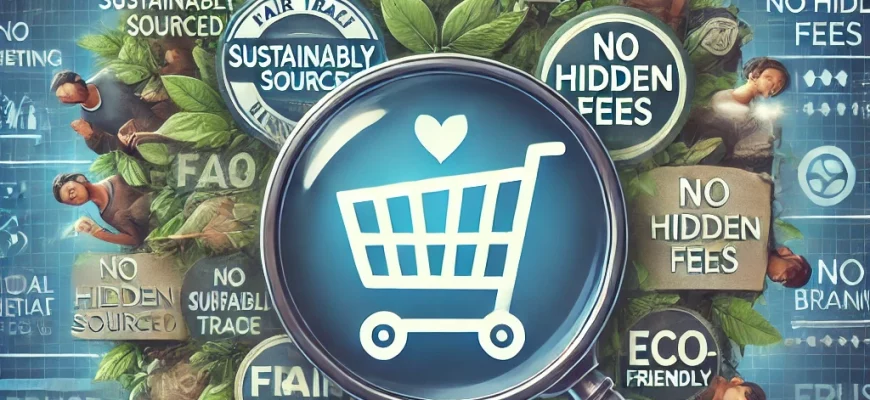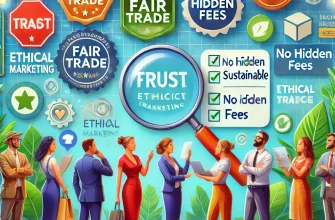In the modern world, consumers can easily find information about the brands they interact with. This level of access has changed what customers care about, making ethical marketing and transparency not just trendy terms, but vital parts of a successful business plan. Consumers now expect brands to be honest and accountable, and if companies don’t meet these expectations, they might lose customer loyalty. Let’s delve into ethical marketing, the importance of transparency, and how businesses can meet these new consumer demands.
- What is Ethical Marketing?
- Key principles of ethical marketing include:
- The Growing Demand for Transparency
- 1. Empowered by Information
- 2. Values-Driven Purchasing
- 3. The Cost of Mistrust
- The Benefits of Ethical Marketing
- 1. Building Trust and Loyalty
- 2. Competitive Advantage
- 3. Enhanced Employee Morale
- 4. Long-Term Sustainability
- Challenges of Ethical Marketing
- How Brands Can Embrace Ethical Marketing
- Conclusion
What is Ethical Marketing?
Ethical marketing involves using moral principles to promote and sell products or services. It values honesty, fairness, and responsibility, focusing on building long-term relationships rather than just making quick profits. Ethical marketing includes being clear in communications, treating employees fairly, using environmentally friendly practices, and committing to social responsibility.
Key principles of ethical marketing include:
- Honesty: Sharing accurate and truthful details about products and services.
- Fairness: Ensuring all stakeholders—customers, employees, and suppliers—are treated justly.
- Sustainability: Minimizing environmental damage and promoting sustainable practices.
- Respect: Avoiding exploitation or manipulation, especially of vulnerable groups.
The Growing Demand for Transparency
The rise of ethical marketing is closely linked to the increasing consumer demand for transparency. Today’s consumers are curious about the inner workings of their favorite brands. They want insight into how products are made, who makes them, and the broader impact of their purchases.
1. Empowered by Information
The digital era has equipped consumers with an abundance of information. Social media, review sites, and investigative journalism make it difficult for companies to conceal unethical practices. Consequently, consumers are holding brands accountable.
2. Values-Driven Purchasing
Many people, particularly Millennials and Gen Z, choose products based on their personal values. A 2021 Nielsen survey showed that 73% of global consumers are ready to change their buying habits to lessen environmental impact. Transparency about sourcing, labor practices, and sustainability efforts is crucial for gaining their trust.
3. The Cost of Mistrust
Lack of transparency can cause serious reputational harm. Scandals involving false claims, greenwashing, or unethical labor can lead to boycotts and long-term brand damage. Conversely, transparency builds trust and customer loyalty.
The Benefits of Ethical Marketing
Adopting ethical marketing and being transparent isn’t only about avoiding negative consequences. It’s also a strategic move that can bring significant benefits.
1. Building Trust and Loyalty
Being transparent builds trust, which is the cornerstone of customer loyalty. When brands are honest about their values, practices, and even their mistakes, consumers are more likely to stay loyal.
2. Competitive Advantage
Ethical marketing helps brands stand out in crowded markets. Companies that are transparent often attract customers who are willing to pay more for ethically made products.
3. Enhanced Employee Morale
Employees prefer working for companies that share their values. Ethical marketing can improve employee morale and retention, reflecting a company’s commitment to doing good.
4. Long-Term Sustainability
Adopting ethical practices supports a brand’s long-term success. Companies that tackle environmental and social issues now are better prepared for future market changes.
Examples of Ethical Marketing in Action
Patagonia
Patagonia stands out as a leader in ethical marketing, prioritizing environmental sustainability in all its operations. The company focuses on creating durable, high-quality products and encourages customers to repair items instead of buying new ones. Patagonia is upfront about its environmental footprint and donates 1% of its sales to environmental initiatives.
TOMS
TOMS is renowned for its “one-for-one” model, where a pair of shoes is donated to someone in need for each pair sold. Though the company has broadened its charitable focus to encompass wider community impacts, social responsibility remains at the heart of the brand’s mission.
Ben & Jerry’s
Ben & Jerry’s is distinguished by its commitment to activism, advocating for social justice, climate action, and fair trade. The brand openly addresses political issues and is transparent about its sourcing and business practices, which resonates deeply with its customers.
Challenges of Ethical Marketing
While the advantages of ethical marketing are apparent, its implementation can pose several challenges:
- Balancing Profitability and Ethics
Ethical practices often lead to higher costs, such as those associated with sourcing sustainable materials or ensuring fair wages. Balancing these expenses with profitability requires strategic planning and a focus on long-term goals.
- Greenwashing and Authenticity
Some companies falsely claim to be ethical, a practice known as greenwashing. Consumers are adept at spotting insincerity, so it’s crucial for brands to back up their claims with genuine efforts and measurable results.
- Navigating Complex Supply Chains
Ensuring ethical practices across global supply chains can be complex. Achieving transparency demands rigorous oversight and a commitment to continuous improvement.
How Brands Can Embrace Ethical Marketing
To effectively implement ethical marketing and transparency, companies can follow these steps:
Define Your Values
Identify the core values that drive your business. These values should be genuine and align with what your audience expects.
Be Honest and Open
Offer clear and accurate information about your products, pricing, and business practices. If there are areas needing improvement, acknowledge them and outline your plans to address the issues.
Focus on Sustainability
Adopt eco-friendly practices, from reducing waste to using sustainable materials. Highlight these initiatives in your marketing to connect with environmentally conscious consumers.
Engage with Stakeholders
Involve customers, employees, and suppliers in your ethical practices. Transparency works both ways, and open communication builds trust.
Leverage Certification and Standards
Certifications like Fair Trade, B Corp, or USDA Organic indicate that your brand meets established ethical criteria.
Conclusion
Ethical marketing and transparency are essential for building a successful, resilient brand. As consumers become more informed and value-driven, they expect honesty and accountability from the companies they support. By adopting ethical practices and maintaining transparency, businesses can build lasting trust, foster loyalty, and contribute positively to society. In a market where integrity is paramount, ethical marketing is not just good business—it’s the right thing to do.








